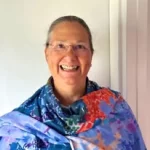Last Sunday morning, I gave a talk at the Ridgefield Congregational church. Below is a synopsis of what I said.
Discover Your Spiritual Authenticity
Who Are You?
Most people don’t know. Most problems in life stem from an identity crisis and are solved by a better understanding of who they are.
When I ask you “who are you,” most people say their name. But if I write their name on a piece of paper and point to it and ask them, “Is this you?” they say no. Then they tell me where they live, what they do for a living, or what size they are. But those things change. When they were different (like when you were four) were you still yourself? Yes. So that’s not who you are. Likewise, your thoughts and emotions change so that’s not who you are.
You are consciousness. You are awareness.
You are not even your gender or race because consciousness and awareness have no gender or race. And if before you were born and after you die you still exist, are you of a certain gender and race then? You can do without a lot of things, but if your awareness didn’t exist, you wouldn’t either. That awareness is who you are and what you have always.
What makes you worthy?
Is it grace or works? The first chapter of Genesis in the Bible says we are made in God’s image and likeness and that we are very good. This grace of our creation makes us worthy. We are already pre-approved. It is just up to us to know God and to image God forth– to explore and express your spiritual identity with devotion and through works.
What is the 300 and how do you do it?
“The 300” is an exercise of my own devising that I often ask clients to do. I have found it enormously helpful in my own life and spiritual practice.
It consists of making a list of at least 300 qualities and attributes of God. The better you know God, the clearer you’ll know yourself as reflection. Most people can write down about 60 qualities and attributes before they start slowing down, but keep going. Make it a fun treasure hunt. I have as many as 1200, but really, there is no end to them.
God made us in God’s image and likeness as very good, so that is a big clue that God is good. Challenge the words you put on your list. Are they good? Words like vengeful or disappointed (while articulated in the Bible) do not represent the glorious, ultimate, supreme, most high. We need to be careful to work at being God-like instead of falling into the common trap of making God out in our image instead. Jesus came to show us the miracles that can occur from seeing everything as God does–very good.
Consider words like infinite, all powerful, ever-present, and good. Intelligent, wise, merciful, loving, beloved, lovable, gentle, honorable, immortal, impartial, harmonious, precise, generous, rejoicing, flawless, established, orderly, magnificent, kind, alive, beautiful, resplendent, caring, boundless, victorious. Note that all these qualities and attributes are non-material! Is God funny? Yes; just look at a baboon’s bottom, and you’ll know God has a sense of humor. Is God patient? Yes. Humble? No, that’s a human quality.
You’ll get so many on your list that you’ll need to alphabetize them to avoid getting duplicates. Consider different (overlapping) synonyms of God– Life, Truth, Love, Mind, Soul, Spirit, Principle– and their corresponding qualities and attributes. Feel free to use a thesaurus. You’ll be coming up with qualities as you read, at the stop light in your car, in the middle of a conversation, on your walk in the woods.
Review your list each morning and praise God for being this way. Identify yourself each day specifically with each one of those words. Choose a word each day and practice DOING IT and seeing it in operation all around you. Those words will give you a clearer, more expansive view of both God and yourself.
Some words you’ll resonate with more than others. Run with your strengths and manage your weaknesses. Be compassionate to yourself where it is hard to do them, but also stretch yourself sometimes to work on ones that come less naturally, since by definition you include them. They’ll start to come easier with practice.
Jesus best expressed the whole range of qualities and attributes. Indeed, the essence of the Christ can be summed up as the complete array of these. When “the Christ comes to us,” or we “see the Christ in others,” or we “follow the Christ example,”or say “Christ is the way,” or we are attracted to someone’s “Christliness,” it is all about these qualities and attributes. But you can get the same good from this exercise if the Christian terminology does not resonate with you.
Consider your list of qualities and attributes as a spiritual to-do list. Work on it everyday. Be a witness to them in others and in the world. DO IT (don’t just think about it). This is when it becomes not just grace but “works” too. Both are equally essential. Enjoy exploring this one relationship that is with you always.
Everyone essential and unique
We all have all of God’s qualities and attributes, so what differentiates us from from one another? One metaphor is that God is the sun, and each of us is a ray with different coordinates radiating outward. The light (the Christ or the array of qualities and attributes) is the same but our direction is all our own.
Within the range of qualities and attributes, there is a huge variety of permutations and combinations. This matrix reveals mathematically an infinite range of emphasis, gradations, and combinations. One person’s strength may be flexible, while another’s flexibility might be strong. While I am easily creative and colorful, I struggle with patience. Another might be exceptionally patient, but less creative. These variants make us unique, even though we all include all of God’s qualities and attributes.
To explore another analogy, think of each of us as a unique number. Even though there are infinite numbers, each one is essential to making the whole number system work. If any number were omitted, unrepresented, or lost, all of mathematics would collapse. Each of us may only be a facet of the whole, but without us, God’s self-knowledge would be incomplete. God created us in their image and likeness to see themselves. You and I are part of that.
The rubber hits the road & why does this matter?
In order to “love your neighbor as yourself,” we first need to love ourselves. In my work, I’ve learned that most people don’t. This is usually because they think they need to be the source of their worthiness. As we’ve already seen, God is the Source, and we are merely the pre-approved outcome. By understanding who we are as God’s image and likeness, we can start to actually love ourselves in a healthy, humble way.
This makes us less insecure, for we understand our basis and role, and that we are supported, pre-approved, and worthy. This makes us less anxious, because God now is at the center of things, in charge of other people and outcomes. With the whole range of qualities and attributes, you can start to see that you couldn’t lack anything, and neither can anyone else. You realize you are already completely supplied with everything you need. This eliminates envy and jealousy, since everyone has all of God’s qualities and attributes.
Now you can actually love your neighbor as yourself, with understanding and appreciation, since we all are made out of the same fabric of being. This fosters civility and less polarization. We can find God’s qualities and attributes manifested in anyone (at least some of them), even those we disagree with. You can walk through life seeing each person as beloved of God, and look for how each one exudes the Christ consciousness. Everyone does it in some way, even if all we can identify in them is that they are alive.
When Jesus looked at the blind man, or the leper, or the lunatic, he saw and identified them as God did, with all those qualities and attributes intact, and not as the material senses represented them. Doing this follows the Golden Rule–which is in every faith tradition– to see each other as God sees us, manifesting all of God’s qualities and attributes. Isn’t that what we want from others? Then we should extend the same.
Focusing on ourselves and others as the complete range of qualities and attributes of God removes limitations and frees us to become Renaissance men and women–good at many things– expressing in myriad ways our authentic, diverse, and terrific selves. We become more satisfied and less frustrated. We experience harmony and joy with others, all having what we need, competing less, and cooperating more.
This work builds to literal peace on earth, helps insure the survival of our species, and is tantamount to the salvation of the world. Rather important! So do it. It starts with you knowing, being, loving, and expressing the fulness of what God made you to be: God-like!
5 Comments
-
Polly – this is precious – I shall begin at once. … thank you.
And you are priceless – I haven’t come across a baboon’s bottom before in relation to spiritual authenticity …. am still chuckling! x -
What an important message you delivered to the members of this Congregational church. And to all of us reading those powerful and divinely sweet words. I look forward to implementing these ideas with more intention. Thank you for sharing.
-
Lovely ideas Polly!
My Christian Science teacher described God’s children and their reflection of His spiritual qualities like the coloured glass pieces in a kaleidoscope. It is always the same pieces we see but arranged in infinitely different ways! I love that idea. Xx-
Author
Oh I love that idea too!
-
Pingbacks
-
[…] I’m grateful for the opportunity to speak to our local Congregational Church (here’s what I said). […]








